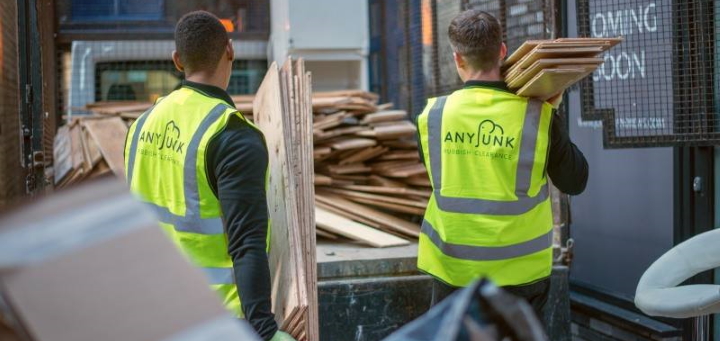Eight things you should know before hiring a skip

Here is our list of the top eight things you should always know before you go out and hire a skip. For more detailed guidance and advice, click here:
- What can and can’t go in a skip?
- What is a skip permit?
- How much does skip hire cost?
- How can I save money on skip hire?
- What size will I need?
- How long can I hire a skip for and when is it collected?
- What are wait-and-load skips?
- When is it better to use a man-and-van service?
1. What can and can’t go in a skip?
You can put most things in a skip provided they are not hazardous. Here is a list of the most common items that are prohibited, but always double check with your skip supplier.
- Asbestos
- Batteries
- Clinical waste, including syringes
- Electrical appliances and equipment
- Fluorescent tubes
- Fridges, freezers and air conditioning units
- Gas canisters and gas bottles
- Hazardous and toxic materials
- Oil, petrol and diesel
- Mattresses (although sometimes they take these but charge extra)
- Paint (unless empty paint tins)
- Plasterboard
- Tyres
- TVs and computer screens.
Note that if you do try and sneak any of these in your skip, then the skip company will be very unhappy because they are not licensed to move or process that type of waste. As a minimum they may get very grumpy, but as a worse case they could charge you for any cost and liabilities they incur as a result.
2. What is a skip permit?
If you are placing your skip on a road or public highway, you’ll require a skip permit from the local council. If you don’t have a skip permit, you could be fined and have the skip removed. However, a permit isn’t needed when the skip is on private land such as your driveway or front garden.
The average cost of a skip permit in the UK is £30. The skip provider will organise the permit for you and it usually takes the council a few days to process the application – bear this in mind when ordering the skip.
3. How much does skip hire cost?
The price of a skip depends on a few factors: the size of the skip (bigger skips are more expensive), whether or not you need a permit, and geography (skip hire is generally more expensive in the South compared to North). Here is a helpful guide that breaks down costs of hiring a skip by UK city.
4. How can I save money on skip hire?
Sharing a skip with a neighbour is a great way to save money – you can order a big skip and split the cost. It also means they won’t sneakily dump their waste into your skip during the night! It’s normally better value to book a bigger skip because the bigger it is, the cheaper it costs per cubic metre to hire. So if you have enough waste to fill it, go for the bigger option.
Another way to save money on a skip is to fill it correctly. If you break down the waste, you’ll be able to fit more in. It’s unlikely that you’ll exceed the weight limits unless you have lots of heavy, inert waste. Be careful not to fill the skip past its level load (the top of the skip) or the skip company could charge you for the extra contents or leave the extra waste on your property.
5. What size skip will I need?
The right-sized skip depends on the volume of your waste and how much space you have for the skip. The most common skip size is a six-yard small builder’s skip because it is perfect for DIY and building projects. Most councils don’t allow for any skips bigger than eight yards on a public highway, so keep this in mind.
6. How long can I hire a skip for and when is it collected?
Duration and collection dates are flexible with skip hire. You are normally given the choice of when you’d like the skip to be collected when you book, or you can notify the skip company once it’s ready.
If you want to hire a skip for over two weeks, ask the skip company when you book. Some will extend the hire at no extra cost and others may charge additional for longer hire. The cost of your skip permit may also increase with a longer hire duration.
7. What are wait-and-load skips?
If your waste is ready to be collected straight away, or you don’t have the space for a skip, this is the ideal option. A wait-and-load service is when a skip lorry arrives with a skip and waits for you to fill it. As soon as this is done, the skip will be taken away.
8. When is it better to use a man-and-van service?
If you’re unsure what size skip is right for you, a man-and-van service is a great alternative because they charge based on the volume of waste removed. This means you won’t end up paying for space you haven’t used – or even overfilling a skip if you have more waste than you thought – because they can amend the size and costs on the day.
Additionally, if labour is an issue, man-and-van services also do all the labour and hard work for you.
To check prices for skip hire or man-and-van rubbish clearance in your area, go to AnyJunk.










1 Response
[…] take it away again once you’ve filled it with the necessary waste. There’s even potential for a “wait-and-load” service if what you have to dispose of is ready to take away […]